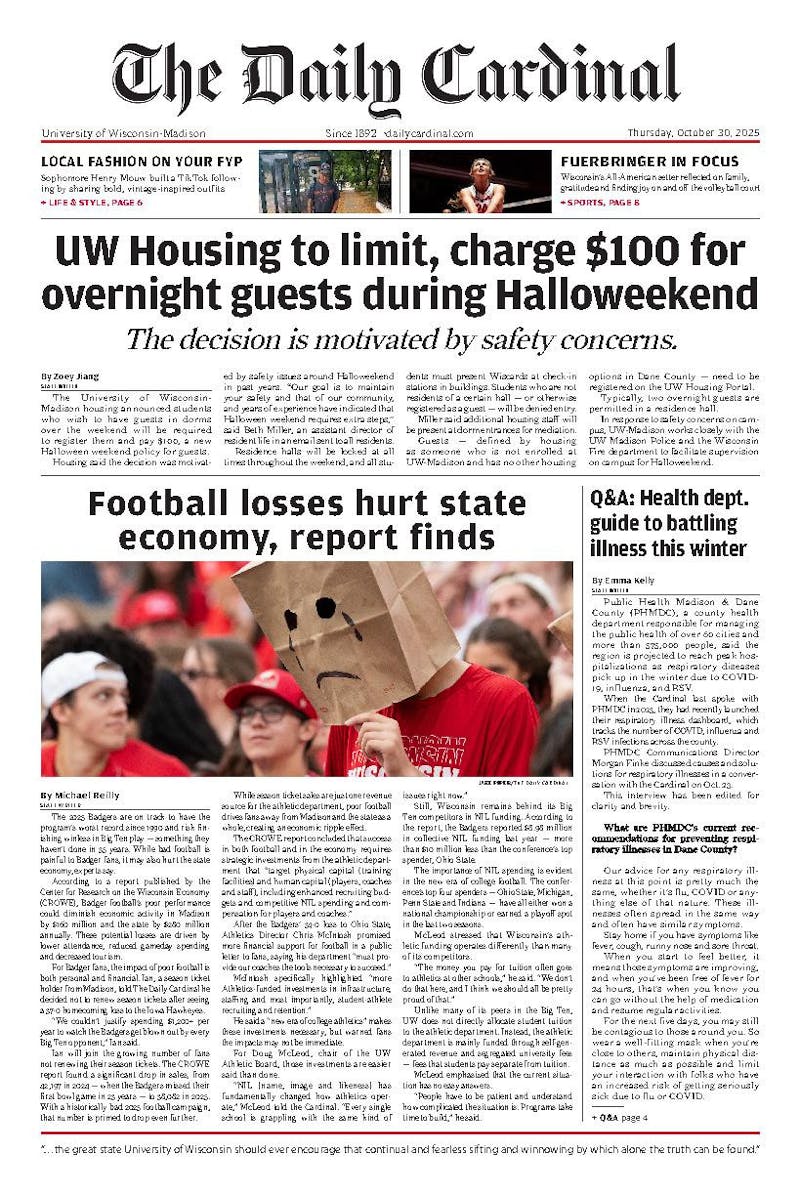Professor, author and orator Brittney Cooper discussed the need to reframe narratives surrounding attacks on justice and recognize individual power in reforming systems rooted in oppression at her keynote speech at the Monona Terrace Community and Convention Center Saturday for the University of Wisconsin-Madison Department of Gender and Women’s Studies 50th Anniversary Celebration.
The 2025 Golden Anniversary Celebration: “Forward Together!” took place over the course of two days from Oct. 24 to Oct. 25 and featured dancing, food and speeches by professors, graduate students and community members alike.
“This celebration that we're having over the next two days provides a way to look back at the past and all the things that we've accomplished, and then chart a new path forward,” department chair Nicholas Syrett told The Daily Cardinal.
50 years ago, the Women’s Studies Program at the University of Wisconsin-Madison set out to change the way history is studied, switching from focusing largely on the contributions of white men to a history in which the contributions of all are taught and valued.
Over the two days, the department celebrated the past 50 years with a panel discussion on the enduring legacy of Gender and Women’s Studies 103, multiple workshops and the keynote address which was followed by dinner and dancing.
Cooper teaches courses ranging from Black Feminist Thought to Hip Hop as a professor of Women’s, Gender, and Sexuality Studies and Africana Studies at Rutgers University. .
She has authored five books including the New York Times bestseller “Eloquent Rage: A Black Feminist Discovers Her Superpower” and “Beyond Respectability: The Intellectual Thought of Race Women.”
Cooper said in her address that part of an individual's ability to “meet this moment” lies in the ability to be honest about the histories that have brought us here.
“We are watching the fascists, the deniers of truth, the anti-intellectuals storm into places that we have built for vulnerable students, the descendants of the same vulnerable students who stormed the gates 50 years ago demanding and insisting upon something very simple, which is that we be allowed to study ourselves,” Cooper said.
UW-Madison’s Gender and Women’s Studies department was created in 1975 after students protested professor Joan Roberts being denied tenure by an all-male committee. The committee alleged that her work did not meet university standards, despite male colleagues being granted tenure for less. Roberts eventually sued the university for gender discrimination, winning $30,000 and creating the catalyst for the department’s inception.
“Women are determined to continue to foment rebellion until they finally bring about equality for women, inside and outside the hallowed halls of academia,” Roberts said at the time.
Since then, the program has grown into a full academic department that offers over 100 courses, as well as a Women’s Studies Certificate, a LGBT Studies Certificate and a Gender and Women’s Studies Master’s Degree program.
During her keynote speech, Cooper asked the crowd “What if we are the storm?” — reframing the narrative that attackers on justice and equity hold the power by proposing the energy and momentum towards justice lies within every person.
“What if we are the storm in a system that cannot handle us?” Cooper asks. “What if we are here to bring this crumbling, outdated, violent, unsustainable infrastructure to a crumbling halt?”
She urged the crowd to consider America’s national infrastructure was not set up to handle the power surge of unrelenting movements demanding justice and redress concerning white supremacy, patriarchy and justice for queer and trans people.
In this moment, and in every moment, Cooper said, Gender and Women’s Studies are the storm.
“We are the energy of these places,” she said, “the bringers of light when folks are making terrible decisions for us all in backrooms, the thunderous voices of protest and proclamation when folks would assault us with the sonic whiteness of infinite irrationality.”
Cooper said that reactionaries can try to turn away from the pursuit of justice, equity, repair and democracy all they want but that they will simply be running on borrowed time.
“Over here while we are waiting on their battery to run out, we will be building, remembering ourselves again…gathering together, moving in silence, being still when we need to,” Cooper said. “Whatever the moment requires.”






